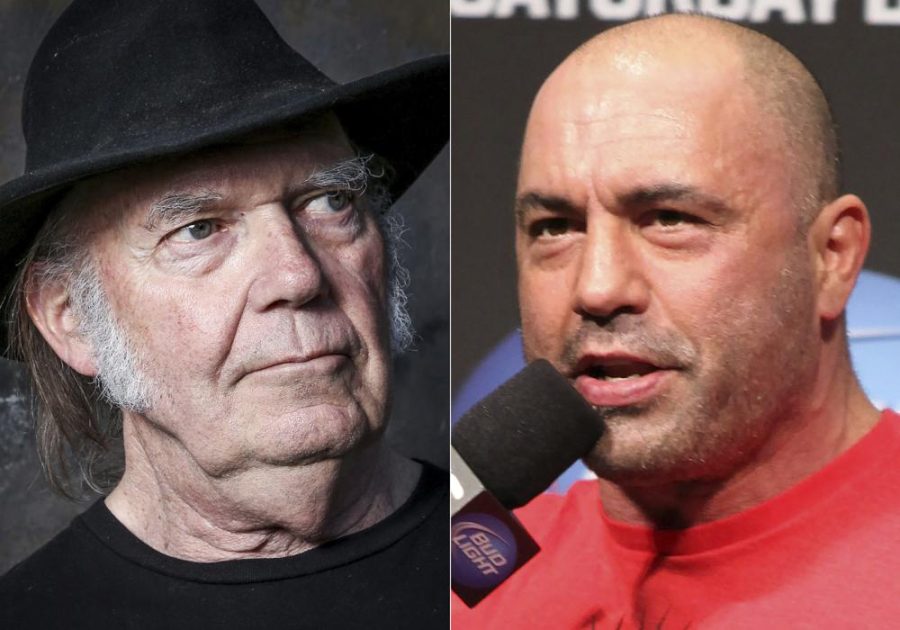The case for quitting Spotify
Neil Young’s activism sparks ethical questions for Spotify listeners
Associated Press
Musician Neil Young (left) and political commentator Joe Rogan (right) are at the source of Spotify’s most recent controversy
Rock star Neil Young has pulled his music from Spotify because of vaccine misinformation in the podcast “The Joe Rogan Experience.”
Young, in a letter sent to his management team, demanded Spotify remove his music from their streaming platform if they did not instead remove Rogan’s podcast.
The 76-year-old legend, known for classics such as “Heart of Gold,” and “Old Man,” wrote, “With an estimated 11 million listeners per episode, JRE, which is hosted exclusively on Spotify, is the world’s largest podcast and has tremendous influence… Spotify has a responsibility to mitigate the spread of misinformation on its platform, though the company presently has no misinformation policy.”
I agree. For that reason, I will no longer be renewing my Spotify subscription.
Many others have expressed concerns over vaccine misinformation on Rogan’s podcast.
In January, 270 medical professionals and scientists signed an open letter to Spotify. Enclosed was a message asserting that Rogan has been spreading COVID-19 misinformation and conspiracy theories.
The letter singled out a December episode that featured virologist Robert Malone, who has been criticized for spreading baseless vaccine conspiracy theories. Malone said on the show, “There’s all these rumors that you would hear about what a hospital gets paid per Covid death and that the government gives them money and that they’re incentivized… It’s not rumors.”
An additional theory he discussed was that people were endorsing the vaccine because of “mass formation psychosis.”
The health professionals’ letter addressed these falsities, saying, “Mass-misinformation events of this scale have extraordinarily dangerous ramifications… This is not only a scientific or medical concern; it is a sociological issue of devastating proportions and Spotify is responsible for allowing this activity to thrive on its platform.”
In response to both letters, Spotify has begun to remove Young’s music from its platform.
With increased backlash over their siding with Rogan, as well as artists such as Joni Mitchell and Graham Nash additionally removing their music from the app, Spotify took further action by issuing a content warning for podcast episodes on COVID-19 and provided links to reputable resources for accurate pandemic coverage.
Spotify’s chief executive noted the importance of free speech when justifying the company’s actions. “It is important to me that we don’t take on the position of being content censor,” he said.
When it comes down to it, however, this isn’t an issue of censorship. It’s about the hard cash entering Spotify’s pocket.
Spotify is a tech company taking in billions of dollars each year, its main priority to maximize profits; which is why, in 2020, the company doled out over $100 million to gain exclusive rights to––you guessed it, The Joe Rogan Experience.
Back when the deal was made, the streaming service’s market cap increased by an incredible $1.7 billion in only 23 minutes, according to the New York Times.
Spotify’s increasing value hasn’t stopped there. Rogan has amassed approximately 11 million listeners per episode from his loyal fanbase, as Young wrote in his letter. His followers contribute significantly to company earnings. Ultimately, it’s unsure whether or not Spotify will take more action to prevent the spread of misinformation.
But to consumers, it appears that the value of human life has paled in comparison to Spotify’s pursuit of profit. Thus, Spotify listeners now face an essential question: Where do we draw the line?
Well for me, it’s right here.
When an entity makes unethical decisions, or holds bigoted beliefs, it becomes my responsibility to stop giving them support. So for me, Spotify will soon join the ranks of corporations I no longer give my money to, and I’m not alone.
Many others have made the case for deleting the streaming service, with #deletespotify gaining traction across social media platforms such as Tiktok and Twitter, to stand against Rogan’s airing of conspiracy theories.







































